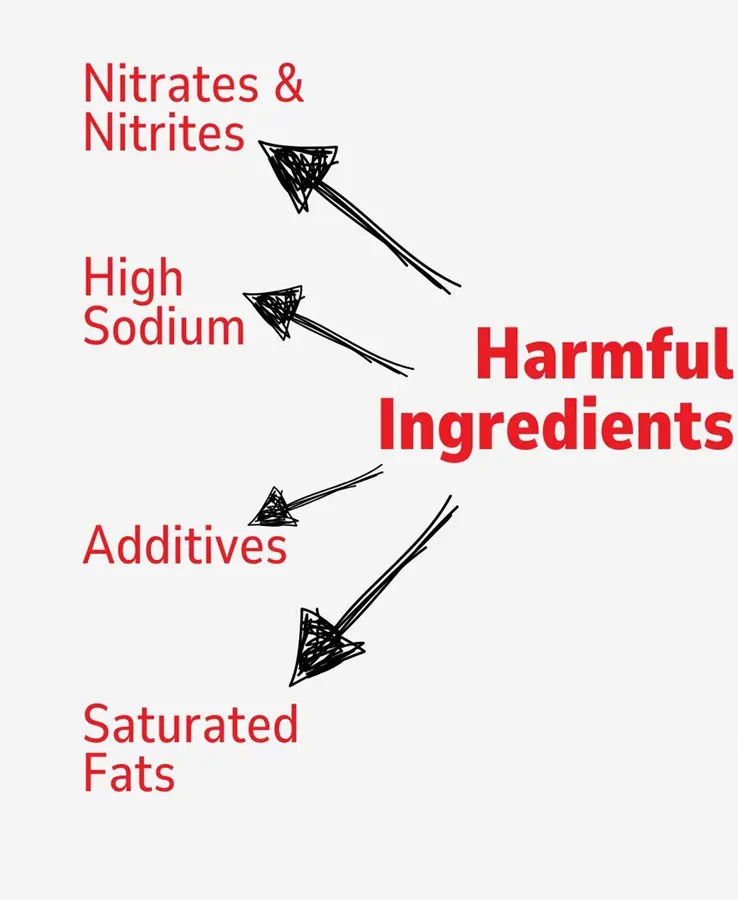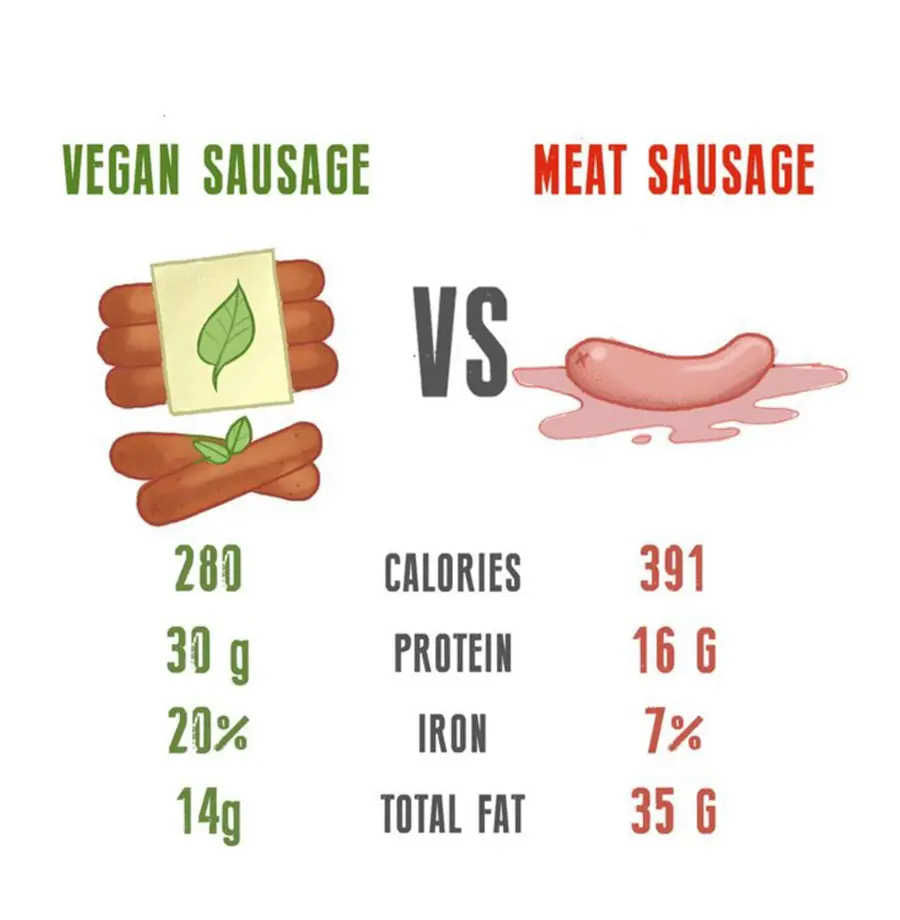Is Sausages Healthy? Nutrition And Health Benefits

This post may contain affiliate links. If you make a purchase through links on our site, we may earn a commission.
Sausages are tasty in an addictive way, making them one of the most popular foods worldwide. You may have enjoyed this convenient food often, whether on a bun with mustard or grilled on a barbecue, the simple preparation methods are what makes its consumption rate high.
Although sausages are mostly protein, the other ingredients used in the preparation have made their benefits questionable. Here, in this article, we will look at the nutritional value and health benefits the sausages have to offer. Additionally, we will guide you in selecting healthier sausages, the ones that are devoid of health risky ingredients.
Nutritional Value of Sausages
According to the USDA, 100 grams of organic chicken sausages have nutrition in the following amounts:
- Energy: 132 kcal
- Protein: 20.59 g
- Fat: 4.41 g
- Carbohydrate: 1.47 g
- Calcium: 29 mg, Iron: 1.06 mg
- Cholesterol: 81 mg, Sodium: 750 mg
- Vitamin C: 3.5 mg, Vitamin A: 588 IU
Sausage Varieties High and Low In Calories

Out of different types of sausages, certain ones like pork sausage patties, beef bratwurst, Polish sausage, and chorizo are high in calories. The fat and spices loaded, typically in the preparation of these varieties make their calorie count higher.
Chorizo, in particular, is a flavorful sausage made from pork or beef and seasoned with chili peppers, adding extra calories due to its fat content. Also, blood sausages made from the pork blood and fat, can also be high in calories, as it contains both fat and blood, which makes the sausage dense. Though consuming this type of sausages are best sources of iron and other nutrients, calorie content must be considered if you plan to include it in your diet.
On the other hand, sausages low in calories include the ones made from leaner meats. The plant-based alternatives and Boudin sausage also fall under this category. They make a perfect lighter choice of sausages for those looking to reduce their calorie intake but without sacrificing flavor.
Nutritional Content Of Sausages

All sausages are a mix of different nutrients, among which protein and fat are the primary ones while carbohydrates and other micronutrients are present in lesser amounts. Let's explore the typical nutritional profile of sausages:
Protein
Sausages are prepared from animal protein and most of the time it is the main component of sausages Being a good source of protein, they can be added to the diet to help functions in our body like metabolic processes running. The protein content however is not the same in all sausages and is different as per the type of meat used in the preparation.
If we look at the value, pork and beef sausages are higher in protein as compared to chicken or turkey sausages. In general, a three-ounce serving of sausage on average has around 8 to 15 grams of protein.
Fat
Fat is the second most available nutrient in sausages but you can expect this statement to change. For instance, premium pork sausages have a fat content that is 1.5 times the amount of protein.
The fat content totally depends on the types of meat used in sausage, fatty cuts of meats like pork and lamb will have higher levels of fats including saturated fats. Opposed to this, the ones made from leaner sources of meat would have lesser fat content which is observed in sausages made from turkey or chicken.
As the fat content depends on the type of sausage you choose to consume, you can expect a three-ounce serving size to have a fat content of anywhere between 7 and 30 grams.
Carbohydrates
Sausages certainly have low carbohydrates, as they are made up of all meat. As they have negligible amounts of carbs, they can be thoroughly enjoyed by people who have their diet focused on foods that are low in carbohydrates.
However, in cases of sausages like breakfast sausages, additional carbohydrate sources like breadcrumbs or rice might be used as an ingredient which can improve the mouthfeel as well as bind ingredients well. With the addition, the carbohydrate content somehow increases. On average, a three-ounce serving of sausage has only one to five grams of carbohydrates.
Sodium
Sodium is one of the key ingredients in sausages that have multiple benefits, it helps preserve them and also increase their flavor. How sausages come out of a manufacturing industry depends on the use of sodium.
A typical three-ounce serving of sausage, of any kind, can contain anywhere from 300 to 900 milligrams of sodium, the amount is about one-third of the daily recommended intake. Though sodium is important for flavor and texture, this high value is something to be conscious of.
Vitamin and Minerals
Sausages are generally not a significant source of different vitamins and minerals. However, they do contain some of them in notable amounts. Some common ones are:
- B Vitamins: You can easily find B vitamins in sausages. Some common ones include B12, B3, and B2, important to conduct various functions of the body.
- Iron: Sausages, especially those made from red meats can have abundant amounts of heme iron. This type of iron delivers oxygen to our body cells and can also prevent anemia.
- Zinc: The sausages made from red meat also have zinc. This mineral is vital for functions like healing wounds. Red meats, in particular, are known to be high in zinc.
- Phosphorus: This mineral is commonly present in sausages made from meat. It is important in maintaining the structure of bones and teeth.
Benefits of Sausages

The right choice of sausages can contribute positively to our health. The benefits of sausages that are chosen and prepared wisely include:
High-Quality Protein
Sausages which are mostly meat, more than 70% on average are high in protein. The ones that are made from leaner cuts of meat are even more proteinaceous.
What's even more interesting is that the sausages made from animal meats contain all the amino acids our body requires. To gain protein benefits to maximum, you need to make sure that there are no fillers, especially the carbohydrate ones used in the preparation of sausage.
Good For Muscle Growth
Because of their high protein content, sausages can be utilized by our body in muscle growth and recovery. This can benefit people who exercise regularly, as it helps repair muscle fibers broken down during physical activity.
For individuals looking to build muscle, incorporating sausages into a post-workout meal can aid in recovery. Opting for leaner sausages will also help avoid excess fat intake while still meeting protein needs. Moreover, plant-based sausages can also help in growing muscles.
Some Are Source Of Healthy Fats
While many sausages contain fat, some options like chicken (and other made from leaner meats) and also plant-based varieties have a healthier fat profile. Some sausages like the ones whose main ingredient is beef, may contain omega-3 fatty acids. This fat keeps our heart protected.
Additionally, some vegan sausages may incorporate healthy fats like those from olive oil, coconut oil, or nuts, which can support brain function and overall health.
Has Notable Amount Of Vitamins And Minerals
Sausages, particularly those made from animal products, can be a rich source of vitamins and minerals that are crucial for overall health. For example:
- Vitamin B12, present in a high amount in sausages is important for red blood cell formation and nerve function.
- Iron, especially heme iron present in red meat can enter our blood and help in the transportation of oxygen in the body.
- Zinc helps in the formation of immune cells also helps immune system to exhibit a proper response. Not only that, it is related to growth and development of the body cells.
- Phosphorus and selenium are other important minerals present in sausages.
Tips To Avoid Unhealthy Sausages

The presence of unwanted ingredients in undesirable amounts is enough to make all the health benefits of the sausages questionable. So, it's important to know all the ways you can prevent unhealthy sausages from entering your kitchen. The few important ones are given below:
Avoid Sausages With High Saturated Fat and Cholesterol
Sausages made using leaner meat sources should be given priority to avoid possible health risks. The ones that are high in fat, usually the ones made from pork or beef, can make your body deal with unhealthy levels of saturated fats as well as cholesterol.
These unhealthy fats, as we continue to consume sausages in excess, can increase the risk of heart disease and other health issues.
Limit Sausages High in Sodium
The curing and seasoning process in sausage making can abruptly increase the levels of sodium. The high level is linked with high blood pressure which can progress to more severe cardiovascular problems.
So, it's best to opt for sausages with lower sodium content to help maintain a balanced diet.
Avoid Sausages with Harmful Preservatives and Additives
The preservation of sausages is based on the use of different chemicals. Though chemicals are important in sausage production, we need to be careful enough to avoid sausages that contain harmful chemicals.
One of the examples of preservatives that are not generally recommended as safe (GRAS) include nitrates or nitrites, these chemicals are said to be dangerous for consumption as they are said to be able to initiate cancer.
It's always best to choose sausages produced by reliable brands, the ones manufactured according to the guidelines produced by the Food and Drug Administration (FDA) and the United States Department of Agriculture (USDA), the ones that regulate the production of meat and meat products.
Ways To Make Sausages A Part Of Healthy Diet

Here are some effective ways to make sausages a part of a healthy diet. Following this will help you enjoy sausages without compromising overall health.
1. Choose Leaner Options
Sausages made from fatty meats are good occasionally. For the ones who love to have sausages in their meal regularly, it's better to opt for the ones that are made from lean meats. Chicken sausages and even the ones made from lean cuts of pork and beef can be the perfect choice here.
The lower levels of saturated fat prevent the risk of its accumulation in the body keeping you away from related heart risks. Besides fat, calories are also significantly low in these sausages. Alternatively, vegan sausages which are prepared from plant-based ingredients can also be a better option for regular eaters.
2. Limit Sodium
Sausages, the ones that are processed can be high in sodium. So, always try to check labels while you are purchasing sausages and go for the ones that are low in sodium or indicate "no added salt".
For regular use, you can also make sausages at home. Doing this allows you to control the amount of salt used in the recipe. Sodium content in your meal can also be balanced by going for other foods that are low in sodium.
3. Cook Them Properly
The way you cook also determines how healthy your meal will be. First, cook sausages properly by grilling, baking, or broiling sausages rather than frying them in oil to reduce the amount of fat and calories in the final dish. Removing the skin or any visible fat before cooking can also make sausages a healthier choice.
4. Balance with Vegetables
A generous portion of vegetables served alongside sausages can make a huge difference. The vegetables added thoughtfully can make meals complete in terms of nutrients.
For the best result, you can pair sausages with a side of roasted vegetables, salads, or steamed greens. This helps to get the needed amount of fiber, vitamins, and minerals.
5. Moderation is Key
Sausages, even if they are lean or plant-based, should be consumed to maintain balance in the diet. While they can be tasty and addicting, they shouldn't be the primary protein source in every meal.
Except for sausages, aim to vary your protein sources by adding foods like legumes and nuts to your diet.
Vegan Vs Meat Sausages

Vegan sausages, made from plant-based ingredients like soy, seitan, or lentils, tend to be lower in saturated fat compared to traditional meat sausages. This difference in the presence of this particular fat reduces the risk of heart disease. The fibers present in these sausages provide an extra advantage, they keep our digestive system healthy.
Furthermore, vegan sausages can be a tasty option for vegans and vegetarians and the protein content can resemble that of meat sausage in cases the primary ingredient used is soy or pea protein. Vitamins and minerals from plant sources can also be expected to be in vegan sausages. Moreover, some of them are even fortified with specific types of vitamins and minerals.
However, not all vegan sausages are equal in terms of healthiness. Many commercial plant-based sausages are highly processed and may contain significant amounts of sodium, artificial flavors, and preservatives. These can diminish the health benefits especially if you are monitoring salt and chemical additives' intake in your diet.
Recent posts
Nutrition
Nutrition
Liquorice Root: Benefits And Uses
You can spell it liquorice or licorice; this herb or root has been in use for centuries in most medicinal applications, as a natural sweetener and to enhance flavors. Regarding its origins, it comes from the root of the "Glycyrrhiza galbre" plant and...
Nutrition
Is Ramen Healthy? Here's What Dietician Says
Ramen is a traditional dish from Japan that in the recent era has become a global phenomenon. This beloved and comforting soupy dish however has been questioned, when it comes to its nutrition. Best for those looking for a quick (instant), affo...
Nutrition
Is Wheat Bread Healthy? An Expert Picks
Wheat bread has been proudly celebrated as a dietary staple in countless homes for as long as people can remember. It has earned a reputation as a healthier alternative to white or any other processed bread, that no one can deny. Because of its evide...
Nutrition
Ice Cream Benefits: Nutrition, Potential Risks And Best Choices
Not gonna lie, ice cream is often taken as a guilty pleasure treat, a delightful treat that takes you to cloud nine but is frequently associated with negative health implications. Nonetheless, the happy news is when devoured mindfully, ice cream can ...
Nutrition
Is Sushi Healthy? Some Good and Bad Choices
Sushi is a wholesome meal and a beloved Japanese dish. The traditional sushi recipe is a simple combination of fresh fish, vegetables, and vinegared rice which is popular for its minimalistic preparation. As with any food, there are factors that dete...
Nutrition
16 Benefits Of Coriander That Will Surprise You
Abundant in nutrients and antioxidants, coriander is an annual herb with a characteristic aroma that is extensively used around the world. Both coriander leaves (also called cilantro) and seeds are used in various cuisines around the world. Known fo...







